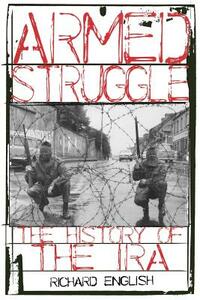Take a photo of a barcode or cover
informative
reflective
slow-paced
I think the book did a decent job contextualizing the IRA's actions. However, the author avoids analyzing the Troubles in a settler-colonial which leads to a lot of bothsideing.
As thorough a telling as any history I’ve read. Every side is given their shake and the amount of research here is IMMENSE.
While I’m more sympathetic to the IRA than English is (there are heroes here, namely Theo Wolfe Tone, Michael Collins, James Connolly, Bobby Sands), there is no arguing with his representation of IRA violence as continually ill conceived and unnecessary. It becomes abundantly clear as the book goes on that the IRA were fighting ostensibly against the British, but for an ideal that would "save" people who didn’t and don’t want it. The sectarian Irish state brought on by British colonization is a tragedy, yes. But it’s a tragedy that has aged enough to simply become reality. One that the IRA waited far too long to accept instead of war against.
There is a tremendous quote from former Provisional IRA man Danny Morrison that sums this up: "Don’t be talking about Northern Ireland being artificial; every country was made artificially, all nations are artificial. It’s been seventy years: Israel has a right to exist — we’re living longer than them [i.e. Northern Ireland has existed longer than Israel, and should likewise have a right to exist]. Okay, you didn’t get civil rights but we’re sorry, we want to have a new start.’"
The quip about civil rights is eh but the sentiment about NI is right. It’s a state like any other. One that, as English makes clear, is much happier to exist as is than as the IRA conceives it. While the early IRAs ambitions were admirable, it becomes increasingly clear that their war was based more in their own blind passion and dogmatism than reality (though the British are villainous, right to the end, no doubt).
It’s sad to see a re-emergence of even inklings of this violence. It’s important to remember that the British are the true villains here. They created the divide. But, it’s equally important to remember that generations of people have now lived in, grown in, identified with these nations full of their own personalities and customs and that simply is the reality of things.
Had a great conversation with a Pakistani friend about the lingering impact of colonialism (Yeah, heavy stuff) and she said "at a certain point the people have no choice but to fight for their autonomy; it’s human nature." And I agree. It’s human nature for Ireland AND Northern Ireland. A unified Ireland is one in a long list of casualties of the British empire, and it is a shame. But that’s the past, and the people of both Irelands right now have a right to determine their own lives, their own autonomy. It’s only human nature, it’s only right.
While I’m more sympathetic to the IRA than English is (there are heroes here, namely Theo Wolfe Tone, Michael Collins, James Connolly, Bobby Sands), there is no arguing with his representation of IRA violence as continually ill conceived and unnecessary. It becomes abundantly clear as the book goes on that the IRA were fighting ostensibly against the British, but for an ideal that would "save" people who didn’t and don’t want it. The sectarian Irish state brought on by British colonization is a tragedy, yes. But it’s a tragedy that has aged enough to simply become reality. One that the IRA waited far too long to accept instead of war against.
There is a tremendous quote from former Provisional IRA man Danny Morrison that sums this up: "Don’t be talking about Northern Ireland being artificial; every country was made artificially, all nations are artificial. It’s been seventy years: Israel has a right to exist — we’re living longer than them [i.e. Northern Ireland has existed longer than Israel, and should likewise have a right to exist]. Okay, you didn’t get civil rights but we’re sorry, we want to have a new start.’"
The quip about civil rights is eh but the sentiment about NI is right. It’s a state like any other. One that, as English makes clear, is much happier to exist as is than as the IRA conceives it. While the early IRAs ambitions were admirable, it becomes increasingly clear that their war was based more in their own blind passion and dogmatism than reality (though the British are villainous, right to the end, no doubt).
It’s sad to see a re-emergence of even inklings of this violence. It’s important to remember that the British are the true villains here. They created the divide. But, it’s equally important to remember that generations of people have now lived in, grown in, identified with these nations full of their own personalities and customs and that simply is the reality of things.
Had a great conversation with a Pakistani friend about the lingering impact of colonialism (Yeah, heavy stuff) and she said "at a certain point the people have no choice but to fight for their autonomy; it’s human nature." And I agree. It’s human nature for Ireland AND Northern Ireland. A unified Ireland is one in a long list of casualties of the British empire, and it is a shame. But that’s the past, and the people of both Irelands right now have a right to determine their own lives, their own autonomy. It’s only human nature, it’s only right.
dark
emotional
informative
reflective
medium-paced
informative
reflective
slow-paced
Very interesting and perceptive books that shows both sides of the troubles in northern Ireland. The author manages to stay neutral throughout the book while telling IRA's story.
3.75. a fantastic achievement that forwards scholarship but disorganized and needed stronger editing to tease out the themes English suddenly introduces in the conclusion (!)
informative
reflective
tense
a very good overview of the IRA from 1916 through the Good Friday agreement, with an obvious emphasis on the Provos. Focuses much more on high level themes and trends than individual events and participants. An objective view on the troubles that digs into the motivation and circumstances behind republican and loyalist thought. A little dry at times but comprehensive and well worth the read. Recommend for any Irish history fans
Patiently and exquisitely argued history and analysis of the provisional IRA movement. I personally was hoping for more granular campaign details of the 1970s and 1980s—and the book delivers in its history of the prisoners’ movements and protests—but i was very willing to settle for a detailed history of known movements and actions followed by English’s extensive and thoughtful concluding analysis, which felt like it considered every position fairly and in good faith while also not shying away from damning conclusions (such as that the last 23 years of the troubles were in many ways fought for no military gain to the IRA, yet had they surrendered and opened themselves to compromise post-1974, their opponents most likely would not have, making peace nonetheless impossible. A complex and insightful book I’m glad to have spent the time with.
dark
emotional
hopeful
informative
reflective
sad
tense
slow-paced




